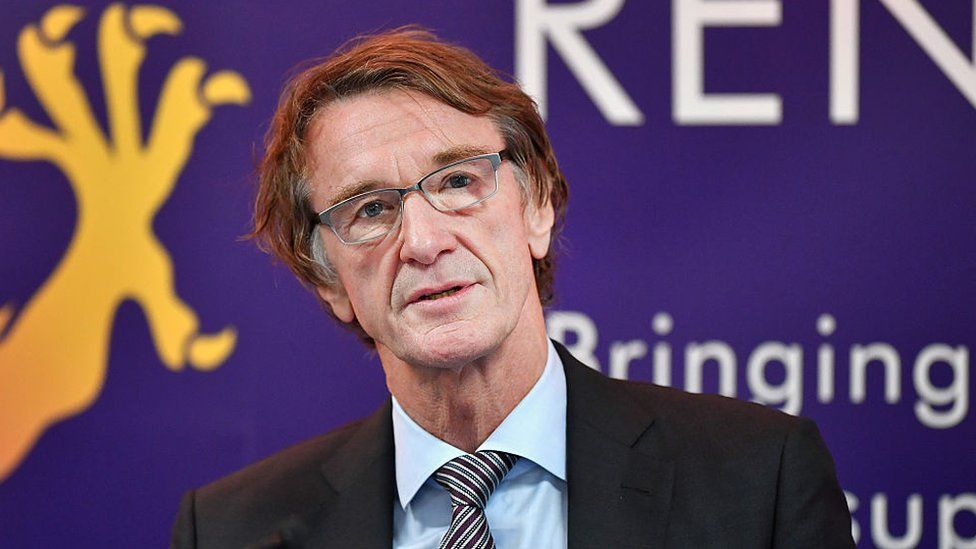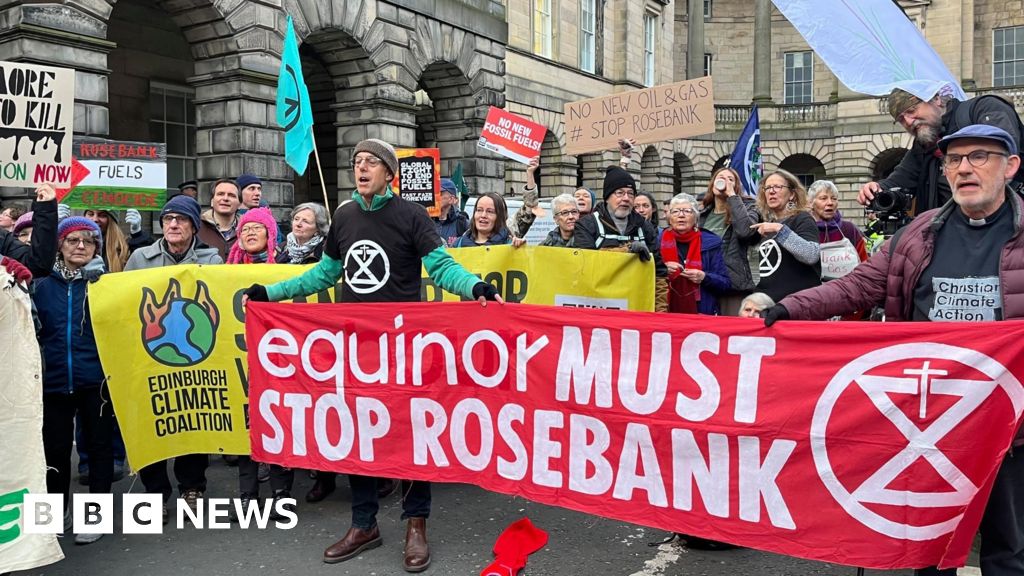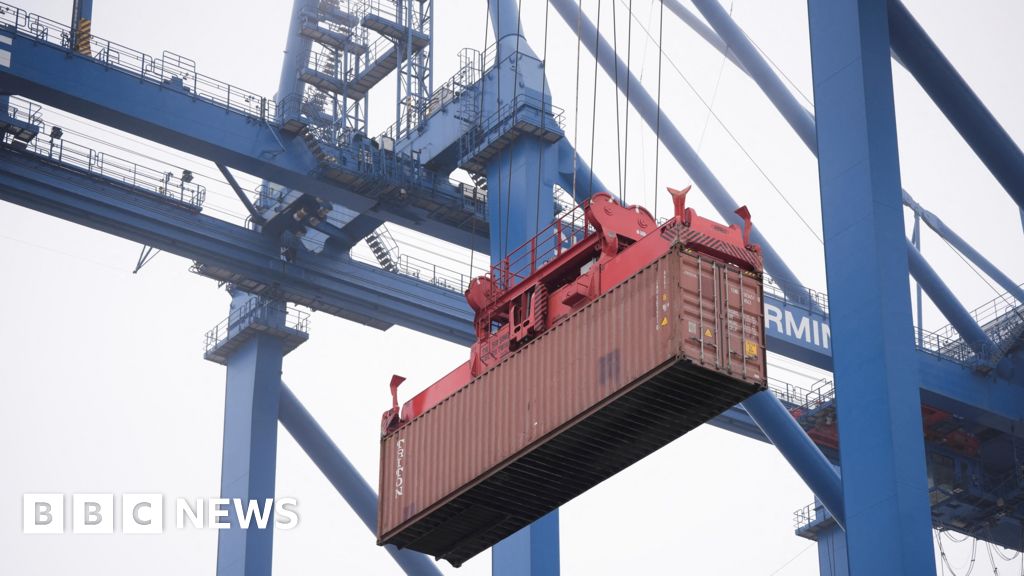ARTICLE AD BOX
By Dearbail Jordan & Noor Nanji
Business reporters, BBC News
 Image source, Getty Images
Image source, Getty Images
One of the UK's richest men, Sir Jim Ratcliffe has built a multi-billion pound business by buying unloved assets. Now he wants to buy Manchester United.
News of the Ineos founder's interest follows a Bloomberg report that the Glazer family - United's current owners - are willing to sell a minority stake in the club.
United, 20-time English champions, are bottom of the Premier League after losing both their opening games of the season under new manager Erik ten Hag.
The poor start has intensified criticism of the Glazers and their perceived lack of investment in the team.
The club has struggled since Sir Alex Ferguson retired in 2013 and has not won a trophy since 2017.
Born in Failsworth, in Greater Manchester, Sir Jim is a boyhood fan of United.
"If the club is for sale, Jim is definitely a potential buyer," his spokesperson told The Times.
"If something like this was possible, we would be interested in talking with a view to long-term ownership."
In many ways it is a familiar modus operandi for the man once called Dr No by trade unions for his tough negotiating stance.
Through buying up and turning around cast-off parts of other businesses, Sir Jim has built up a huge fortune - although estimates of his wealth vary.
Forbes puts it at just under £11bn, whereas The Sunday Times Rich List, which lists him as the 27th wealthiest person in the UK, says it's closer to £6bn.
Art of the deal
From operations once owned by the likes of oil giant BP, Sir Jim created a company - Ineos - whose chemicals and raw materials go into nearly everything we touch every day.
From 194 sites across 29 countries, Ineos generates sales of around £50bn and employs more than 26,000 people.
Its raw materials are used in everything from packaging for toiletries, medicines and food, to mobile phones and furniture.
Sir Jim, 69, has always been involved in chemicals and industry.
After graduating with a degree in chemical engineering from the University of Birmingham in 1974, he spent a very brief spell at BP before jumping to rival oil business Esso as a trainee accountant.
Armed with an MBA from the London Business School, Sir Jim moved to fabric and chemicals producer Courtaulds before a career-changing step into the world of private equity when he joined Advent International in 1989.
Advent served as a platform for Sir Jim to learn the cut and thrust of doing deals.
But after just three years, he was already making a leap into co-owning a business based on what would become a well-worn strategy.
He and fellow businessman John Hollowood decided to buy BP's chemicals division in Hythe, Kent for £40m in 1992. By 1994, it was valued at £100m when it floated on the London Stock Exchange.
The business, Inspec, went on to acquire BP's speciality chemicals business in Antwerp, Belgium.
Sir Jim then left Inspec to form his own firm, Ineos, in 1998 which bought the Belgian business for £89m. Ineos has since grown to become a chemical powerhouse.
Because of his decision never to float the company and thus have no City shareholders to consult, Mr Ratcliffe, who is the majority shareholder of Ineos, has been able to move quickly on deals.
Image source, Getty Images
Image caption,Ineos reversed a plan to close its Grangemouth plant in 2013
Arguably, the most important of these deals was Ineos's £5bn takeover of Innovene, BP's petrochemical business, in 2005.
Overnight, it quadrupled Ineos's sales to more than £18bn and doubled its staff numbers to 15,000.
Innovene also included the Grangemouth petrochemical plant and refinery in Scotland which, in 2013, became the scene of a tense stand-off with trade unions threatening strike action over pay and pensions.
Tough operator
The dispute - which earned Sir Jim the Bond villain moniker of Dr No - led to Ineos announcing that it would close the petrochemical plant and cut 800 jobs.
Shortly afterwards, Ineos reversed its decision when the Unite union agreed to a survival plan to invest £300m in the plant to keep it open.
Ineos continues to expand either through acquisitions such as buying the Forties Pipeline System from BP, or through investment into controversial areas such as fracking.
In April this year, it said it wanted to build a fracking test site to show the process can be performed safely.
The technique was halted in the UK in 2019 amid opposition from green groups and concerns over earth tremors, but there have been calls to rethink the ban, given the recent rise in the cost of energy.
Sir Jim said that with the UK in the "midst of an energy crisis", it was a "ridiculous situation with so much gas under our feet".
Image source, Getty Images
Image caption,Ineos bought the motorcycle wear maker Belstaff
In recent years Sir Jim's business interests have moved away from chemicals. He announced plans to build a new vehicle based on the Land Rover Defender, which was discontinued in 2016.
However, in 2020, Sir Jim, who was a Leave campaigner in the run-up to the 2016 Brexit referendum, said the new 4x4 vehicle would be built in France, ending hopes it would be made at a new plant in Wales.
In 2017, Ineos bought Belstaff, the luxury motorcycle wear maker whose jackets were once worn by actor Steve McQueen and modelled by the likes of David Beckham.
And in 2019, Sir Jim became the new owner of a high-profile professional cycling team, after Ineos took over the former Team Sky. The team is now called Ineos Grenadiers.
Whether or not these businesses could be classed as unloved is not certain, but Sir Jim clearly saw plenty of potential in them.
In May, Sir Jim made an unsuccessful £4.25bn offer to buy Chelsea after owner Roman Abramovich put the London club up for sale.
At the time, he told BBC Sport he was a Manchester United fan and the reason he was not bidding for the Red Devils is because they were not for sale.
Sir Jim also owns French side Nice and Swiss club Lausanne-Sport, while Ineos has a partnership with the Mercedes F1 team.

 2 years ago
20
2 years ago
20








 English (US)
English (US)